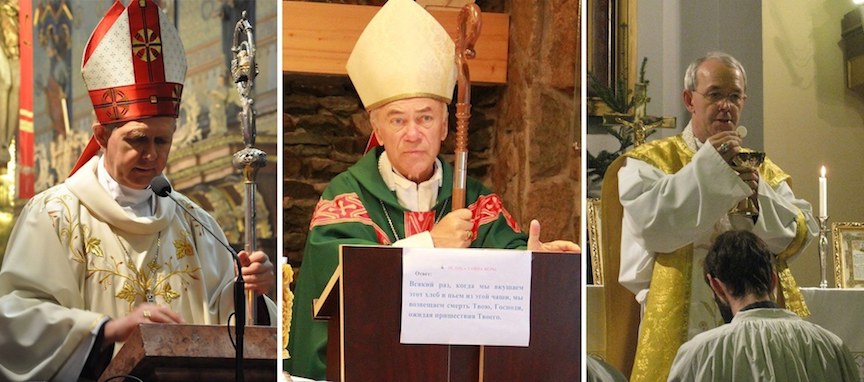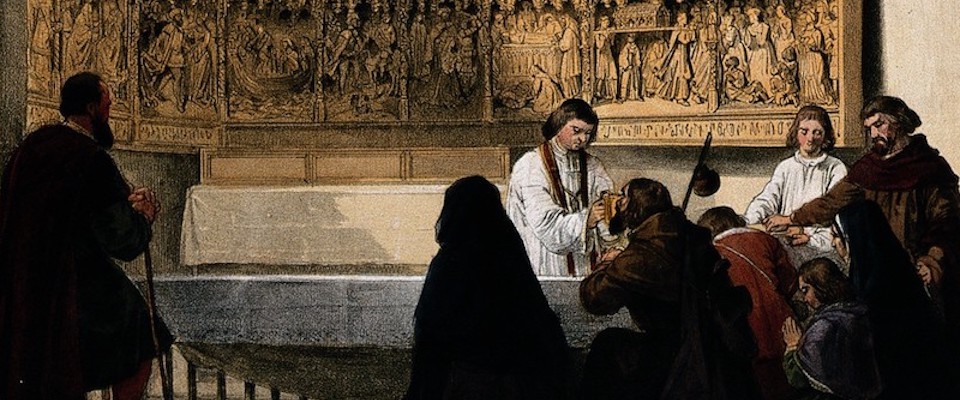By Fr. Timothy V. Vaverek, The Catholic Thing, Jan. 10, 2018
![]() Three bishops in Kazakhstan have solemnly professed the Church’s received teaching and discipline regarding sacramental marriage and the limited conditions under which the “divorced and remarried” may receive Holy Communion. (Three more bishops and a cardinal have now joined them.) Presented “before God who will judge us,” their Profession is effectively an apostolic declaration that these are matters of faith and morals that no one, including other bishops, may reinterpret so as to approve sexual activity in “second unions” or to permit Holy Communion for those who continue such activity.
Three bishops in Kazakhstan have solemnly professed the Church’s received teaching and discipline regarding sacramental marriage and the limited conditions under which the “divorced and remarried” may receive Holy Communion. (Three more bishops and a cardinal have now joined them.) Presented “before God who will judge us,” their Profession is effectively an apostolic declaration that these are matters of faith and morals that no one, including other bishops, may reinterpret so as to approve sexual activity in “second unions” or to permit Holy Communion for those who continue such activity.
This is a radical act of apostolic teaching that has few, if any, parallels in living memory. Taken seriously, it would decisively alter the current debates and lead us to consider the very heart of the Church’s apostolic witness to Jesus and his teachings on marriage, the moral life, and the Eucharist.
To date, Cardinal Kasper and others have claimed that the reception of Holy Communion by “divorced and remarried” Catholics who continue to engage in sexual activity can be compatible with Jesus’ teachings. Yet the underlying justification is based on defective notions of conscience, ecclesial discipline, and the relationship between doctrine and practice. Specifically, these theories fail to acknowledge the fact (affirmed by the three bishops) that reception of Holy Communion depends not only on the recipient’s culpability and conscience but also on his objective beliefs and behavior.
Arguing from mistaken premises, the innovators claim that in some cases a “divorced and remarried” person can affirm the doctrine of indissolubility in theory while in practice he can be free in conscience to engage in sexual relations and continue receiving Holy Communion. Their false assumptions also lead them to advocate allowing bishops to decide locally whether to retain or alter the Church’s received discipline. (A strategy reminiscent of the Anglican Communion’s ultimately disastrous attempts to accommodate doctrinal and pastoral divisions.)
This pastoral “diversity” has created contradictory practices around the globe. Although interpretations of Amoris Laetitia have played a role in this process, many of these innovations have for decades been de facto realities in ecclesial life.
Now, the three Kazakhstani bishops are challenging this lamentable state of affairs by formally denouncing the innovations and the erroneous assumptions behind them. In doing so, the bishops reach beyond the limited canonical jurisdiction of their own territory and speak directly to the universal Church as Successors of the Apostles. Their authority and mandate come not from Canon Law, but from Christ himself who placed them in the Church to proclaim the Gospel. (Mt. 28:18 and LG 23-24)
The previous status quo was troubling, but we now face a much graver controversy. The three bishops have issued an apostolic denunciation of teachings and practices advocated or approved by other bishops.
What happens next? The Profession’s publication seems to leave the world’s bishops three options: 1) say nothing, 2) issue a similar Profession, or join this one, 3) publicly reject the Profession.
Saying nothing will undoubtedly seem attractive. It buys time and minimizes the risk of engaging the issues. Such a response is aided by the Profession’s origin in Asia. As a result, media coverage will probably be minimal. And despite the innovators’ expressed concern for those on the margins, they are unlikely to treat this Profession as they would one from Europe. (The Anglican Communion too failed to engage the concerns of its “Third World” members – leading to profound divisions.)
Most bishops will understandably find it difficult to sign the Profession or to issue their own.
After all, disagreement among bishops regarding the Gospel is painful and can shock the faithful. Division and confusion have been present in the Church for two generations, however, and are evident to almost everyone. The three bishops offer a path, difficult and rarely used, that deals with such conflicts openly through a formal act of apostolic and ecclesial communion, presented in charity and truth.
A pragmatic reason for making a Profession is that contradictory practices are unsustainable. Catholics who oppose the innovations as violations of the Gospel will seek to root them out. Those favoring the innovations will encourage diversity – until they can impose changes everywhere. Eventually, a position will have to be taken. (The fragmentation of the Anglican Communion demonstrates the final outcome when contradictions go unchecked.)
Bishops who publicly reject the Profession will probably take the easy path of ad hominem attacks, an increasingly popular approach. It signals that “diversity” really means that bishops who oppose the innovations will be tolerated only if they teach quietly in their own dioceses. Otherwise, efforts will be made to drown them out.
An actual refutation of the Profession seems extremely unlikely. First, this requires a systematic critique and an exact description of the innovations.
Second, any refutation must move beyond media interviews, pastoral letters, or episcopal conference statements. After all, the Profession was offered solemnly before God. To be taken seriously, bishops wishing to refute it will need to demonstrate a similar level of personal commitment.
This raises a telling point. The three bishops have exercised their teaching office through a formal witness to Christ and the Gospel as Successors of the Apostles in a manner rarely seen, an exercise only exceeded by an act of the Extraordinary Magisterium. They have put themselves on the line to shepherd the flock.
Every bishop knows that many Catholics believe “before God” that the innovations violate the Gospel. They also know there is widespread confusion and a need for sure guidance. Why, then, would any bishop attempt to impose these changes on his priests and people through mere policy statements? Why would bishops refrain – whatever position they take – from personally offering their own witness before God for the benefit their people and the universal Church?
The controversy cannot be resolved without such apostolic witness. Three Kazakhstani bishops recognize this and have set the bar accordingly. The rest of the bishops are now in the arena whether they want to be or not.
__________________________
**Image: The Kazakhstani bishops: Tomash Peta, Jan Pawel Lenga, and Athanasius Schneider







